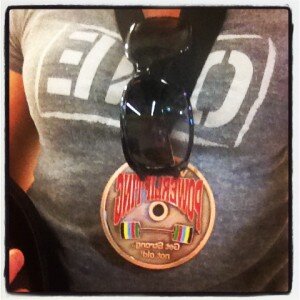Intermittent Fasting Leangains – One Year Later
Learn from my mistakes and victories in intermittent fasting. Diet styles don’t matter; you need a style that meshes with YOU and allows you to live a happy, healthy life. Surround yourself with people who are smarter than you and commit yourself to lifelong learning while questioning everything!
[Read time: about 12 minutes]

I promised this post to a few people after hitting one year consistently using intermittent fasting Leangains style as a diet setup. The year ended in November, so I’m a bit late but I wanted to outline how it worked for me and what I learned. Given that there are lots of questions about this protocol and the positive or negative effects it can have on women in particular. But when I sat down to write it, I realized I didn’t even want to write about IF again at all! Why?
The biggest thing I learned on IF is how much diet styles don’t matter. Any diet style in the world can be the greatest thing, or the death of your sanity and health, depending on what you need, what you can adhere to, and what allows you to live your life happier and healthier.

I also talked about IF 3 months into the process here:
3 Months
This year, my knowledge of fitness and nutrition has skyrocketed, and I credit that to a few factors, namely:
1. “Meeting” Alan Aragon and his research review, Lyle McDonald’s bodyrecomposition.com, and Martin Berkhan at leangains.com.
Reading these great minds gave me a scientific-based education on training and diet for the first time and taught me more in a couple of months than EVERYTHING I learned with my PT certifications and –dare I say – college classes. From there, I started to become aware of the network of “good guys” that are out there and give out great information. What do I mean by good? Coaches and trainers who prefer to remain undogmatic, open-minded, but most important; think critically about information. When you pair this with the results they get with clients, and years of experience you get my definition of “good”.
2. Understanding macros and the basics of nutrition for the first time (thanks to the above).
Such as: the importance of the energy equation and its application in real life, the value of protein and its relationship to fat and carbs, the rejection of food labels as “good” or “bad” and why, how to review research better, when it can apply (or who to turn to when you can’t make it out) or not, how to break down claims or recognize context, the backgrounds behind certain popular myths, understanding the physiology of stress and how to manipulate the variables, and how to break down why something might work for someone but not another.
3. Participating in forums and threads.
Now this is often a debatable pro versus a con because some of these groups and forums online get a bit insane. But what helped me was assisting in answering questions, seeing what people didn’t get or understand and how I would answer them as if they were “my client.” Often I was stumped as to the answer, and would have to go find out myself. I think learning how to ask the right questions and really listen to what someone is saying when they ask your advice is one of the most valuable qualities a coach can have. My idea is that is doesn’t always matter if I don’t know something; it’s if I am willing to find out and I can listen well to get the answer that matters most to that situation (this is much harder in practice).
4. Alan Aragon advised, “Question everything,” so I do. Question EVERYTHING.
This is not picking on something for the sake of picking. It’s leaving NOTHING UNEXAMINED so that you can make the best choice or the best recommendation. Sometimes you will get overwhelmed, but you can always fall back on the basics. Try to think about whether a piece of information will have an impact or not, or whether you can let it go for a time when you can understand it better. The basics are simple, and will make sense and are part of the answer 99% of the time! Stick with those and give yourself time to explore everything else and learn how it may or may not fit. I read somewhere that “It takes the wise to understand the simple.” Try the simplest possibility first that takes your variables into account, and then go from there. Not the other way around.
Now for the continuation of my IF story:
Starting at the end of August, I began training for my powerlifting competition and started a high volume program (Sheiko #29 and #32, then Jr. Smolov for squats). I decided to ease up on tracking calories for a bit, and focus on my performance. I ate a lot, my lifts went up, and I gained a grand total of about 2 lbs from my set-point weight (which was at 129 pretty consistently). I weigh about 131-132 consistently now. I tracked some days, weighed occasionally. I was at an average of 2500-3000 calories a day from end of August to the beginning of December, trained high volume squatting, benching and deadlifting 3-4 times a week and did two powerlifting competitions. During that time, I got firmly over the hump of 225 in both squats and deadlifts. This was a big goal of mine, and I achieved it! Relaxing the focus on my diet and just eating enough allowed me to put the hard work in at the gym in-between two jobs, school full time, and home life with the kiddies. I used Leangains style dieting the whole time.
The high volume did its job in getting my lifts up, but also aggravated some of my individual movement issues, namely weak lumbopelvic control and chronic hypermobility (which is one big variable for me individually). I’ve started a program as of a couple of weeks ago put together by a fellow coach to address those issues, so I can attempt even more strength goals in 2013. One step back, two steps forward. This program is designed to help improve muscle stiffness, postural awareness and breathing, and over-compensating with my stabilizer muscles (as opposed to my prime movers). Because I am all over the place with my joints, I need to be really strong in the RIGHT positions so that my muscles are moving the weight. I have reduced a lot of my stretching/mobility work because it’s not what I need.


Diet-wise, I am back to tracking because I like the accountability, and I tend to not get enough protein and fat gets too high if I am not keeping an eye on it. Although my training is not “easy” by any means, it’s less than what I was doing when you think of volume, but requires much more focus! Regaining good patterns ain’t easy, especially when your body is used to doing it one way. Tracking, at least for me, realistically doesn’t take much of my time per day (thanks to the MyFitnessPal app!), and I don’t change up what I eat too often, which make it much easier, dare I say, necessary to successful tracking. I am cycling carbs, but thanks to my new muscle growth, I can tolerate A LOT more carbs than I used to. A year ago today, eating 100 grams of carbs was a “high carb” day.
My macros now are as follows:
40-50 Fat
150-170 Protein
150-275 Carbs Rest/Training
Calories 1600-2000
Refeed Day – 400+ Carb, 2500+ calories
As you can see, my carbs are pretty high, and I am happy like this. My rest days are usually semi-active since I coach in the afternoons, but if not, carbs can always be cut down a bit. I maintain at about 1800 pretty even. So we’ll see how this goes. This is a conservative calorie count, and I might need to up as needed.

This is just a guideline for me. Even though these numbers might look complicated, the reality is that I hardly stress about my diet at all. I “stress” about the important stuff; total calories, macro balance, and then nutrients. Really. It’s hard for people to understand that because it DOES seem like a lot of work in the beginning. If you are not used to eating relatively healthy at all, start there first.
Get used to eating and cooking foods that should make up the majority of your diet before you worry about anything else. A year ago, I sat down and decided to count macros. It was a huge eye-opener to see what I REALLY was eating and the amounts I was ACTUALLY putting in my body. Adjusting from there was a big lesson on how my body uses food and how certain food makes me feel.
Negotiating the interplay between training, diet, sleep, and life gets so many people frustrated, yet I often see them putting so much time and focus on the wrong things; like stressing about certain food groups, special programming, where to fit in HITT, and LISS, and lifting, and Crossfit. Maybe counting calories IS NOT the focus you need, or maybe it is.
For me in the beginning, it was. Find what you need to focus on to make a real change. That’s where having a coach can help you find that focus and make the changes. With the growing popularity of online coaching, there are some great conscientious and knowledgeable trainers out there (without impossible waiting lists) that can make the journey much easier. People like Rog Law, JC Deen, Libby Wescombe, Nia Shanks, and I are affordable. Better yet, we CAN SAVE YOU TIME! Imagine 2-3 years of experimentation versus 3 months of a plan where you get exactly the information you need for you, come away with loads of knowledge that bypasses all the useless information floating around, and continue with your progress and/or understand how to maintain happily! That, to me, would be priceless. Martin Berkhan wrote a great article about the secret benefit to figuring out all this diet and training stuff. His point: It gives you more time to focus on other things that enhance your life.
For those who care to know what my eating habits look like now:
- I eat my first meal around 2-3 p.m., depending on my training schedule. If I train later in the day, I will eat at 12 or so, more protein than carbs. More often than not, this is whey protein or Chobani yogurt. If I train in the morning, I have BCAAs or whey.
- I eat the bulk of my carbs post-workout. I tried the opposite, but I felt sluggish training. I like carbs later in the day.
- I don’t really “track” my eating window. I have about two meals a day. I get hungry around the same time every day. I go to bed by 11 at the latest and eat my last meal at around 8-9.
- I am able to eat more junk food without major negative side-effects. Don’t take this the wrong way. I STILL have the majority of my diet be normal whole food (DON’T TAKE THIS OUT OF CONTEXT). But, while I used to wring my hands waiting for “cheat day,” cheat day is when I feel like it. Food does not have the same pull anymore. For anyone that has dealt with disordered eating patterns (not even so-called extreme ones), this is a huge deal mentally!
- I sleep fine; I drink coffee every morning. Usually two cups.
- Supplement-wise, I use whey protein to get extra protein in (duh), fish oil, creatine, and beta alanine with caffeine for a pre-workout. Just ran out of BCAAs, but I like the taste and think they help, so I might reorder. I like Scivation Xtend Watermelon.
- Current program is I train 4 days a week with an upper/lower split. Since my focus for the next couple of months is to realign my body, and fix some of my “issues,” I am doing a lot of single leg work, and muscle “activation” work. No heavy squats for a bit (this is because of how I MOVE, and the things I need to work out). Lots of focus on hamstrings, glutes, abs, and lats. Follow me on fitocracy.com, username joyvictoria, to see what I do!
Bottom line: IF’ing Leangains style works great for me and is a comfortable way for me to eat and reach my goals. But in all reality, my diet has a very loose structure and knowing that I didn’t “have” to eat a certain number of times a day or that my body was adaptable to meal timing made a huge change in my progress and fitness.
I would love to comment on all the research floating around about carb-backloading, longevity, health marker impacts of intermittent fasting, how fasting affects hormonal fluctuations and cortisol levels, etc., etc, but really, I don’t understand it well enough yet. At least not enough to explain it in-depth to an unknowledgable population. To get geeky on forums of like-minded individuals is a different story. To learn more about IF in particular, I would direct you to Brad Pilon and Martin Berkhan. I have a ton of links to IF studies, meta-analyses, and papers on it for anyone that’s interested.
To finish I quote Martin Berkhan in his most recent blog post:
Consequence and Clarity
“Until I introduced intermittent fasting and debunked all the bullshit dogma of the times, countless people didn’t have enough options. They didn’t have the knowledge or the information required to make the best decisions, nor did I – and it always leads to failure in the long-term. The best decisions are often relative – and they should be made from the standpoint of your personal preferences, not from the standpoint of subjecting yourself to nonsensical rules.”
“In fact, I couldn’t care less about intermittent fasting if it wasn’t for the fact that it’s the superior decision for diet compliance. For me, it happened to be the magic bullet, just like it’s been proven to be for many others.”
And that, my friends, is the end of it. Cheers.



Achieve your nutrition and training goals with Joy’s expertise and support.
Get started now


